Munich is betting heavily on Gabriel Fauré's half-forgotten opera 'Pénélope'.

During the rehearsals prior to the failed premiere of Pénélope in Monte Carlo in 1913, Édouard Risler dared to confess to Gabriel Fauré: “Your work will endure, but it will take a long time to establish itself.” Not even he could have imagined how, more than a century later, his words would still be sadly prophetic. In Germany, for example, it wasn't performed for the first time until 2002 (in a provincial theater), and in France itself, where it has traditionally been a neglected title, relegated as a rarity to the margins of the repertoire, it didn't reach the Paris Opera until three decades after its premiere. Listening to its music now, and seeing the effect it had on the audience that filled the Prinzregententheater in Munich on Saturday (a Greek-style theater absolutely perfect for hosting the long wait for Penelope), it's hard to understand why.
Fauré began composing what is strictly speaking his only opera (with its spoken parts, Prométhée , which he himself described as a tragédie lyrique , is not really one) at the age of 62 and, absorbed as he was from 1905 onwards for almost the entire year by his obligations as director of the Paris Conservatoire, he did not manage to finish it until five years later, since his academic duties made him, like Mahler, a summer composer. He faced the challenge equipped with experience and wisdom, despite the fact that it was not at all easy to ignore, on the one hand, the Wagnerian heritage and, on the other, already in his own language and musical culture, the revolution championed very recently by Debussy's Pelléas et Mélisande , an opera with no possible sequels. In Pénélope, we find constant echoes or glimpses of both composers, but Fauré ultimately asserts his own personality—classical in form, advanced in harmony—which was captured in a unique score, in which there is much more "singing" than in Debussy, over a dramatic flow that is noticeably more concentrated than in Wagner. He was not helped by a manifestly improvable libretto (by a very young René Fauchois), nor by the poorly rehearsed premiere in Monte Carlo, nor by the fact that the premiere held in May in Paris was followed a few days later, also at the Théâtre des Champs-Élysées, by The Rite of Spring (the musical talk of the whole town), nor, even less, by the imminent outbreak of World War I. The Greek gods seemed to have conspired against the survival of Penelope , who was only occasionally brought out of oblivion in later decades by the redeeming voices of Régine Crespin, Josephine Veasay and Jessye Norman, all of them – paradoxically – great Wagnerian singers.
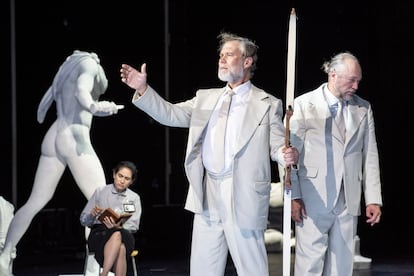
In a letter to his wife a few days before the Monaco premiere, in which he shared Risler's sad prediction, Fauré gave him credence with the following argument: "It is, unfortunately, very likely that this will be the case; it is even certain, if we consider the mediocrity with which the public delights, or with which it is delighted." Unaffected by fashion, Fauré composed the music he wanted, not the music that would guarantee him success. It is not difficult to perceive Wagnerian echoes beyond the strictly musical, reflected above all in the use, starting with the extraordinary orchestral Prelude, of various leitmotifs associated with the main couple and Penelope's suitors ("there is no better system," Fauré laconically confessed in a letter to his wife shortly after beginning the composition). Thus, for example, in the second act, Penelope ascends, as she does every night, with Eurycleia to the top of a hill to see if she can spot the arrival of Ulysses' ship, something very similar to what the dying Tristan and Kurwenal do at Kareol in the third act of Tristan und Isolde. And this same central act of Penelope opens with an instrumental prelude in which the English horn makes its solo voice heard, which also has an essential role in the opening of the last act of Wagner's drama. And Penelope is also, without a doubt, a daughter of Isolde, a woman full of twists and turns and not a cardboard cutout, as so many female characters had been until the arrival of the Irish princess. The mysterious Mélisande and the deranged Salome and Elektra also belong to this same lineage. Because Fauré does not put music to Ulysses' odyssey, but to Penelope's wait, which becomes the center of his poème lyrique .
Andrea Breth, a grande dame of German theatre, initially seemed a good choice to tell the story of this woman who clings to the faith that her husband, despite his very long absence, will eventually return to her one day, while at the same time being harassed by a series of suitors trying to convince her otherwise. In 2019, she directed a disturbing Jakob Lenz by Wolfgang Rihm at the Aix-en-Provence Festival, where she disappointed last year with an irrelevant production of Madama Butterfly . Breth's production, which has always been at its best in the shadowy areas of the human psyche, unfolds in tiny spaces, where the different characters seem trapped as in Huis clos , despite the constant movement through doors that open and close. During the second act and at the beginning of the first, however, we see an open space, the backstage area dotted with statues and antique torsos, with the surprising naturalistic touch in the last two acts of two sheep dummies next to the shepherd Eumaeus. The most controversial aspect, and the least effective dramatically, is the doubling (or even tripling) of several singers with actors of similar appearance and different ages, although frequently separating the singer and his double and, worse still, intermixing them and placing them in different spaces, which must not be helpful at all to the spectators (the vast majority, of course) who are seeing the opera for the first time.
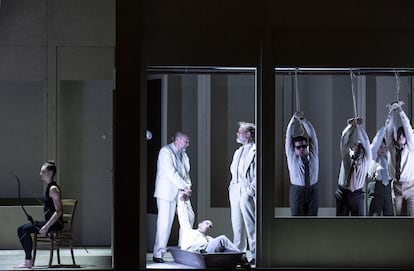
More interesting is the Chekhovian, intimate touch of the staging, which clashes with the gangster-like air of the five suitors with their hats. But Breth ends up falling, like so many other colleagues, into solipsism, seemingly more concerned with her own ghosts and the lace-making to which she condemns herself (her initial proposal closes many paths to her) than with illuminating the work for the audience, who in the case of Pénélope are almost inevitably neophytes. No sooner had the Saturday performance ended, however, than a veteran audience member from Salzburg (where they know their music) stated that he had just decided that, in the final stage of his life, Pénélope would become his favorite opera. And it is just as true that Breth's production does not interfere with listening to Fauré's superb music as it does very little to reinforce its intrinsic theatrical nature.
It was a good decision to entrust the title role to the Russian mezzo-soprano Victoria Karkacheva, possessed of a deep, ductile, and beautifully beautiful voice, which blends perfectly with the Greek sovereign with impeccable French diction (uncommon in Russian singers). Known in Spain for having embodied the character of Olga in Yevgeny Onegin, directed by Christof Loy in both Barcelona and Madrid , singing as she sings and demonstrating excellent acting chops, it is easy to predict a brilliant future for her in theaters around the world. In Munich, she achieved a resounding and well-deserved success. At her side, the veteran Brandon Jovanovich played a much more melancholic than heroic Ulysses, forced by Breth to often adopt statuesque poses (perhaps to further reinforce his wife's humanity). The American tenor possesses the perfect voice and physique to bring this vengeful and rather twisted sovereign to life. The long-awaited moment of anagnorisis, when he finally reveals his true personality to Penelope (he had appeared to her as a ragged old man), is utterly cold, completely devoid of physical contact or warmth, perhaps because Breth believes that the couple's twenty years of separation have irremediably taken their toll on their love, although Fauré's score suggests exactly the opposite. Of the rest of the cast, very homogeneous and with little room for individuality, the most notable were the young baritone Thomas Mole's Eumaeus, and two of the suitors, Antinous and Eurymachus, sung beautifully by Loïc Félix and Leigh Melrose.
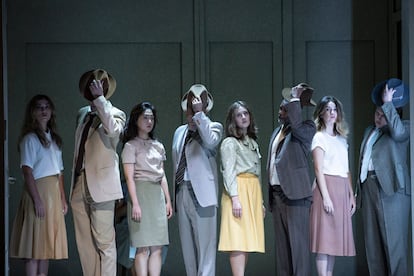
Fauré's stripped-back music, in which not a single note is missing, was admirably defended by Susanna Mälkki, an increasingly established opera director. Last year, in Aix-en-Provence, she conducted Katie Mitchell's revival of Pelléas et Mélisande , the opera with which Pénélope bears so many similarities and differences. The Finnish composer, always analytical given her long association with contemporary music, flawlessly finds the right tone, whether in the melancholic air of many of Penelope's interventions (her Leitmotif , which sounds right at the beginning of the Prelude, is a brilliant find by Fauré) or in the merciless portrait of the suitors. If Fauré eschewed any vague display of instrumentation (dominated by the four-part string composition), Mälkki also measures the orchestra's dynamics to the extreme (sometimes even completely absent in some a cappella passages), also carefully calibrating the solo performances of the wind instruments. He is one of those conductors who lets the audience sing, yet never loses control or the fluid communication between the pit and the stage. And he understood and knew how to capture the central role of a Wagnerian orchestra not in its size or its sonic power, but in its role as a fundamental articulating element of the key moments of the action.
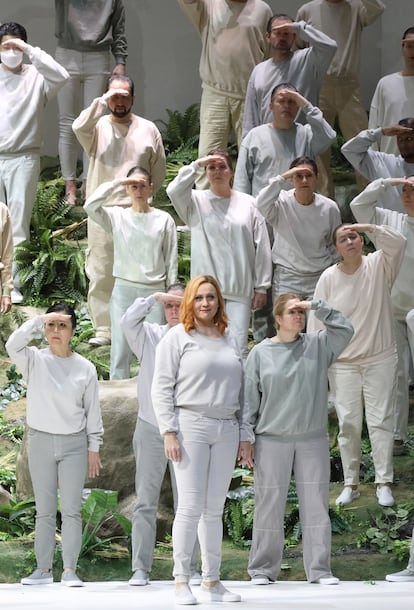
Munich's Wagnerian credentials are unquestionable: they predate the Bayreuth Festspielhaus, and given the tremendous direction things were taking on the Green Hill, who knows if they might not far outlive it. Several musicians (Richard Strauss, Hans Knappertsbusch, and Hans Pfitzner, among them) published a "protest" in the fateful year of 1933 in which they established themselves as spokespeople for Munich as "Richard Wagner's city," with the intention of fiercely attacking Thomas Mann , who had dared to title a lecture initially given at the university of his adopted city, and repeated days later in Amsterdam, Brussels, and Paris, " The Sufferings and Greatness of Richard Wagner ." His critical notes proved indigestible to the delicate stomachs of these devotees of the Maestro, who were soon at the service of the new regime: Hitler had been chancellor for just a few days, and it would be years before Mann set foot on German soil again.
The Prelude from Act I of Lohengrin was one of the Buddenbrooks composer's favorite pieces, and he would certainly have enjoyed the magnificent performance given Sunday afternoon by Sebastian Weigle, conducting the formidable Bavarian State Opera Orchestra. It's rare that a year goes by without a Wagner piece in its summer festival program, an event that, under this or other names, has been held for a century and a half now. Mann would have enjoyed even less the production by Kornél Mundruczó, a Hungarian film director who has also recently become an opera director, although, judging by recent performances in Munich (this Lohengrin originally premiered in 2022, and a very disoriented Tosca , set in Italy during a supposed Pier Polo Pasolini filming, last year), he has yet to demonstrate a talent suitable for this transfer. Although he confesses to having conceived his Lohengrin in a "post-human world" and as a wake-up call to the fact that the need for a savior or messiah ultimately leads to the establishment of a fascist regime, it is difficult to discern either way in a rather hollow, inane production with very few ideas, sustained primarily in Munich by a splendid vocal cast.
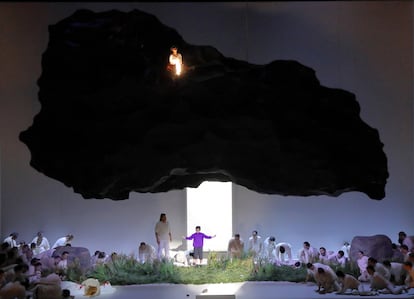
The Knight of the Swan was Polish tenor Piotr Beczała, singing his first non-Italian opera in Munich, and who arguably stands out as the only one whose Wagner, impeccably delivered and sung, sounds excessively Italianate. Opposite him, American Rachel Willis-Sørensen frequently struggled to control her voice, with well-projected high notes but excessively uneven phrasing and a German diction that clearly needed improvement. Unflattering costumes and difficulty navigating a stage filled with traps also didn't help her feel comfortable at any point. The pairing of Ortrud and Friedrich, on the other hand, had two top-flight performers in Anja Kampe and Wolfgang Koch, two long-established Wagnerians with a long list of achievements on their resumes, possessing perfect voices for their two roles (the Bavarian bass-baritone's already showing signs of wear) and, no less importantly, two actors who filled the stage with their gestures (even when they weren't singing) and with their rich body language. Their duet in the second act was a paragon of virtue and perhaps the most accomplished passage of the performance. René Pape, another illustrious Wagnerian, infused his King Heinrich with nobility and wisdom, displaying a vocal state far superior to that of recent times. Everyone shared almost equally in the lengthy final applause, which reserved the greatest thunder of the evening, as is often the case at the Nationaltheater, for the house orchestra, whose familiarity with Wagner always translates, especially with a conductor as experienced as Sebastian Weigle, into prodigious interpretations of Wagner's extremely demanding orchestral parts, including in this case the antiphonal approach of the trumpet fanfares distributed throughout the hall. It was more than five hours of largely forgettable performances in terms of staging, but with numerous high-voltage moments in the musical. The "City of Richard Wagner" will remain so, despite who may be against it, and without the need for grumbling and mendacious lawyers, for many years to come.
EL PAÍS

%3Aformat(jpg)%3Aquality(99)%3Awatermark(f.elconfidencial.com%2Ffile%2Fbae%2Feea%2Ffde%2Fbaeeeafde1b3229287b0c008f7602058.png%2C0%2C275%2C1)%2Ff.elconfidencial.com%2Foriginal%2Fc73%2Fcc4%2F2d1%2Fc73cc42d14cf16ba4f9a9b9e224aca28.jpg&w=3840&q=100)
%3Aformat(jpg)%3Aquality(99)%3Awatermark(f.elconfidencial.com%2Ffile%2Fbae%2Feea%2Ffde%2Fbaeeeafde1b3229287b0c008f7602058.png%2C0%2C275%2C1)%2Ff.elconfidencial.com%2Foriginal%2F3e4%2F858%2F6f1%2F3e48586f117670ce6c875a7e2d970f3e.jpg&w=3840&q=100)


